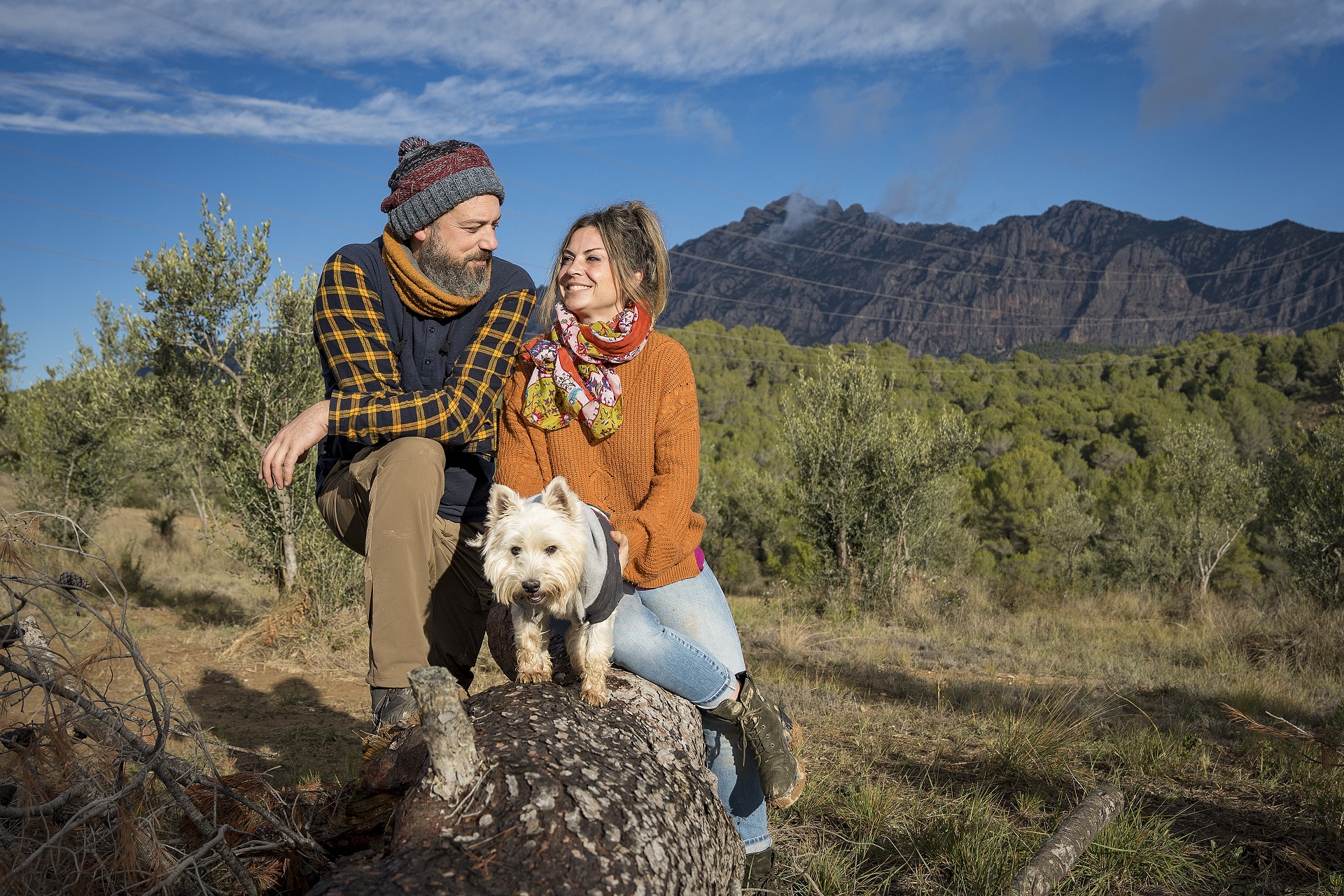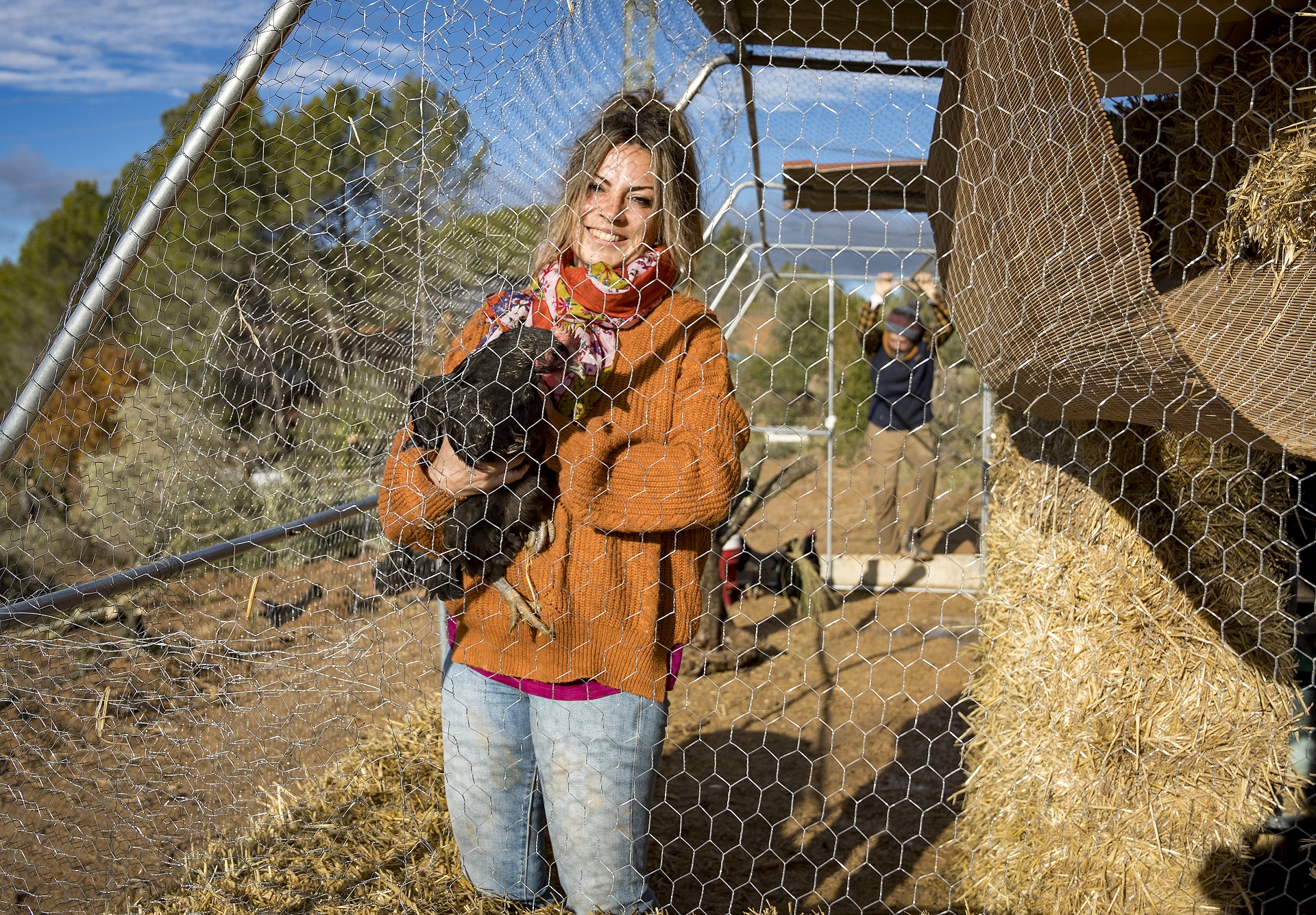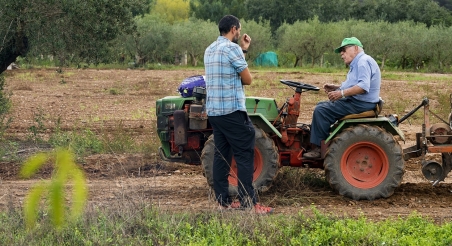Below the imposing scarps of the Montserrat Massif, Tatiana Segura and Sergi Ruiz have started to make their dream come true: Can Rasca Orella. Thanks to the technical support provided by the Land Bank of Montserrat Rural Park, this couple and work team signed an agreement last summer to become tenants of a three-hectare farm set between Esparreguera and Collbató. At the moment they’re designing an educational permaculture project in order to offer nature workshops and activities. They also boast an amazing winter vegetable garden and fields of olive trees, which they’re rejuvenating through pruning. Tatiana (Esparreguera, 1985), who used to work as an auditor, has made a 180-degree career change to “begin a calmer, more authentic life in the countryside”. Sergi (Esparreguera, 1983) will continue to work on audio-visual production projects in combination with his tasks on the farm. Their dog Pepa, a staunch defender of hens, follows them everywhere.
What life journeys brought you to this farm set between Esparreguera and Collbató?
Tatiana Segura (T): I’m from Esparreguera and I had an urban upbringing. My dad was a teacher and my mum ran a beauty and chiropractic massage centre where she practiced reflexology and other techniques that nobody had heard of at the time. They were both committed naturists! I’d always rejected that side of things because, as they say, the cobbler’s children always go barefoot! I’d gone to the other extreme, studying subjects that were far removed from all of that, although every weekend my parents would take us to the forest and we’d sleep there in the van. I began working in finance, first in the area of sales and then as an auditor. The pace was frantic, as it always is in jobs like these. I had a good job with great pay but I really wanted to do something different.
Sergi Segura (S): I’m also from Esparreguera and I don’t come from farming stock. My dad’s a salesperson and my mum’s a salesperson and administrative clerk. Nevertheless, ever since I was little I’ve enjoyed working in vegetable gardens.
What was the turning point that made you take the plunge and embark on this new life?
T: It was after the Covid-19 pandemic, for sure. I needed to be in the countryside and I clearly saw that I wanted what I’ve got now. At the same time, during the pandemic many people began to attach more value to food production. We shared a vegetable garden with a group of people in Esparreguera, through which we helped to deliver food baskets to people’s houses. Sergi and I decided that we needed to produce our own local food. We got to know each other properly thanks to the vegetable garden project in the town. We’d always seen each other around in Esparreguera, we had mutual friends, but we’d never seen each other in this special way. I moved to Òdena, then we decided to share a house and, as they say in Spanish, el roce hace el cariño (close contact breeds affection). Two people with a shared dream have got together, and it’s not a utopia but rather an attainable goal. And if we can also help people to reconnect with nature, then all the better.
So what happened then? What feeds this shared dream?
T: Sergi and I both had jobs. He was working as a producer and fixer, while I was an auditor. We had a shared vegetable garden that proved successful, but ever since we were little we both wanted to live up in the mountains. Ending up here in the mountains was a sort of utopia that we never thought could become reality. So we were both pursuing the same dream and, all of a sudden, our paths crossed and we decided to give it a go. Sergi had already seen the farm and we started to make enquiries about getting in touch with the owners.
«Ending up here in the mountains was a sort of utopia that we never thought could become reality» Tatiana Segura
The farm is set within the Montserrat Rural Park. Did you know the park before you ended up here?
T: No, we discovered it through the support offered by the land bank. We’d heard about the park but didn’t really know what went on here. It wasn’t until we started working with Pere Navarro, the technician of the Land Bank Network, an initiative of Barcelona Provincial Council, that we got the chance to find out what it was all about.
How has the Land Bank of Montserrat Rural Park helped you?
T: We contacted the bank through its website. Actually, we’d already contacted the owners before that, but the staff at the land bank acted as mediators and helped us in the negotiations with them. Pere Navarro gave us plenty of expert advice and we were able to complete a tenancy agreement. We’d go to him with any queries we had and he’d deal with them. He’s an extremely approachable person. The land bank service enables you to obtain a proper contract, offering you a guarantee of security and legal support. At the same time, you know that you won’t be evicted after a year. Our goal is to grow crops, but first of all we have to regenerate the land. There’s no way that can be achieved in a year, or even in two or three years. Maybe we’ll be investing in the project for five years before we get a decent harvest. Imagine if they evict you after two years; you’ll have invested for nothing.
«The land bank service enables you to obtain a proper contract, offering you a guarantee of security and legal support. At the same time, you know that you won’t be evicted after a year» Tatiana Segura
Is the rhythm of nature and the soil out of synch with that of the market?
T: Yes. What we aim to do, and what we believe everyone should do, is regenerate the soil, replenish it with nutrients in a various ways, such as through green manure, managing the composting process, etc. We’ve reached agreements with restaurants in Esparreguera and Collbató: they give us the organic waste that they generate and we do the composting in order to return it to the soil. It’s a slow process but we prefer it to using chemical fertilisers or toxic substances, which in the long term sterilise the soil.
Can Rasca Orella (Scratch Ear Farm). Where did you get the name for your farm from?
T: We chose it ourselves. We’d just been at a deep ecology retreat at a farm in Valls that employs permaculture techniques. It also has a name with a bit of history, Can Pipirimosca. Later on, back here at the farm, I was scratching my ear and Sergi said “Stop scratching your ear!” And with that, we realised we’d found a name for our project!
Getting the farm was a major challenge. Now that you’ve got it, what are your plans?
T: Our goal is to create a project that raises people’s awareness. It will be more an educational project than a farming one. We do want to grow organic vegetables on a small scale, using a time bank system through which people can take part in the project. This will enable them to see how much effort goes into regenerating the soil, to understand why our products are more expensive than those in the supermarket, and to realise that they’re fairly priced. We hope that this will encourage them to commit to fair trade and buying local. Project members will pay a fee in exchange for training. We aim to create an integrated programme that closes the nutrient cycle. The idea is that members supply organic material in order to experience the entire cycle: composting, the vegetable garden and its cycles, seasonal vegetables, etc. The goal is for them to understand what buying organic local produce entails, to understand the difference between a lettuce that costs 50 cents in the supermarket and one that costs €1.50. If you choose the latter option, you’re supporting fairly paid work, which is an important aspect to bear in mind.
What activities are you planning to offer?
T: We’ll have activities related to the vegetable garden and to the forest. We want to offer forest workshops for schools and to familiarise kids and their parents with games that people used to play related to ethnobotany and silviculture: we don’t want these traditions to be lost. And we’ll use part of the house for workshops on wild and edible plants, combined with countryside walks to identify them. If you ask the older generation what they used to eat or what herbs they used, they’ll give you a long list of plants that grow in these parts. You realise that there are plenty of wild plants available, and not only are they free but also they have more properties than cultivated plants.
Have you been inspired by any other projects?
T: We’ve been doing training activities for two years and we’ve visited other permaculture and deep ecology projects in order to weigh up the pros and cons of launching our initiative.
S: The Caña Dulce permaculture school or the La Casa Integral project are some of the initiatives we like the most.
Generally speaking, what do you think the main obstacles are for young people who aren’t from farming stock when it comes to finding land on which to develop their projects?
T: It’s really hard to find land with a house available. It’s also important for the land to have a water supply, which often isn’t the case. We’ve got an electricity pylon on our farm but we haven’t got electricity or water yet. We’re in contact with the local councils of Collbató and Esparreguera about getting a water supply, but it’s a rather tedious process.
What would you say to young people who are keen to embark on a farming project but can’t make up their minds?
T: I’d tell them to contact the Land Bank Network of Catalonia. It’s an essential service that can offer them expert advice on all sorts of aspects, not only in respect of finding land but also regarding their farming project, whether they plan to keep livestock, etc. They’ll help them with whatever they need, so they won’t feel alone. What’s more, the land bank technician, Pere Navarro, puts different projects in contact with each other in order to create a network. It’s very different from feeling lost and not knowing where to turn. Depending on the project, the land bank will help them to decide what type of farm they need (with a well, with or without a house, etc.).
How much progress have you made in getting the farm the way you want it?
S: We’ve been doing a “reset” of the olive trees since last January when we first came to the farm, because we get on well with the owners. We’ve been going about it little by little. The olive trees have to be pruned in order to rejuvenate them, so it’s like starting from scratch. Now we have to try to train the trees so that the branches grow downwards, making it easier to harvest them.
Are there any fun facts you can share with us about Can Rasca Orella?
S: There are a couple of crows that we see here every day. During the day they’re out looking for food, but in the evening they perch on the electricity pylon and caw to each other. It seems to be their meeting point. If there’s one thing about permaculture practice that’s been made clear to us, it’s this: before embarking on a farming project, you need to spend a year on site observing, finding out where the wind comes from and where it goes. Because when it comes to designing a permaculture project, you have to consider everything. It’s about understanding, observing and designing.
How do you get around not having a water supply on the farm?
T: La Casa Integral, an organisation that designs permaculture projects, will create infiltration strips to retain rainwater, enabling us to accumulate more water. Additionally, we’ll install a set of tanks to collect rainwater. And we’ll use a dry toilet system: we can’t be wasting five litres of water every time we flush the toilet! What’ more, we aim to cultivate traditional, native seeds and local crop varieties because we don’t want them to disappear. I’ve already joined the Eixarcolant Collective and I’ve done some training with them.
S: The water engineering system designed by La Casa Integral will enable us to harness rainwater throughout the year and use it for the soil.
What challenges are you worried about at this initial stage?
T: Embarking on a business project is scary. I was an auditor, I earned a decent salary, I had some lovely bosses and a level of job security that many people yearn for. Nonetheless, I decided to pursue my dream. Sergi will be based here in the mountains but will continue his work as a producer, while I’ll be starting to organise workshops. Launching a new project can be a bit dizzying, yet at the same time I think it’s also necessary to make mistakes and learn from them, to keep going... And if in the meantime you have to combine your dream with another job, so be it. Moreover, you obviously need to have some savings, because a lot of investment is required here.
«It’s necessary to make mistakes and learn from them, to keep going... And if in the meantime you have to combine your dream with another job, so be it» Tatiana Segura
Have you received support from those around you?
T: At the beginning, people said we were crazy and asked me what had happened to my job. I’d go to work every day wearing a suit and high heels, I’d use chemical products… But after tending to the vegetable garden and switching to organic food, I began to ask myself where the food I was cooking came from. I read a book about food sovereignty by the social activist Esther Vivas and it had such a huge impact on me that I realised there was no turning back. How could I eat an avocado that had travelled so many miles, or a tomato that came from who knows where? And then I went through the same process with clothes. I’ve been buying second-hand clothes for two years and, if I do have to buy something new, I make sure that no ill treatment has been involved in the manufacturing process, that the work has been properly paid , that it helps generate a fair economy, etc. And I always ask myself this question beforehand: Do I really need it?
Tatiana, from your perspective, what role should women play in new farming projects?
T: This project has empowered me greatly. It’s regenerated me and given me something important: now I feel authentic. It’s really changed me as a person. I have no problem saying no to things these days. And then with clothes, I often wear tracksuit bottoms nowadays and feel so comfortable that I wonder why I didn’t do it before. Now I feel free and able to do whatever I want. I’m not afraid of my own transformation and I’m not afraid of other things either: I can talk to anyone! I think that women are sometimes too focused on appearances, which makes them feel insecure in themselves.
«Now I feel free and able to do whatever I want» Tatiana Segura
Last of all, a culinary question: Could you share a memory of good food that has had an impact on you?
T: I love thyme, I’m an addict, especially now that winter’s coming. What’s more, it boosts your immune system! My mum used to make thyme soup, which has really stayed with me subconsciously. I’ve studied phytotherapy, the use of edible wild plants, which is how I know about the world of plants.
S: Salad is something that’s accompanied me throughout my life. I mean the classic one, with lettuce, carrot, onion and tomato. Every table needs a good salad. Salads have a wide variety of colours, they’re crunchy… And when the products come direct from the soil, it’s a really delicious dish.
— BCN Smart Rural Editorial —




